World Economic Forum: A Critical Management Review of Google's Vision
VerifiedAdded on 2023/04/22
|18
|1790
|148
Presentation
AI Summary
This presentation provides a critical management analysis of Google CEO Sundar Pichai's discussion at the 48th World Economic Forum in Davos, Switzerland. It examines key issues such as Google's shift towards Artificial Intelligence, the risks of Big Data to security, the importance of digital democracy and governance, and workplace diversity. The analysis uses analytical frameworks like paradigms, ideology, discourse, labor process theory, financialization, agency theory, narratives, social construction, and hierarchy to evaluate the views expressed. The presentation highlights both the benefits and risks of technology and AI, emphasizing the need for global collaboration and ethical considerations. The presentation concludes by referencing academic works supporting the arguments.

Critical
Management
Management
Paraphrase This Document
Need a fresh take? Get an instant paraphrase of this document with our AI Paraphraser
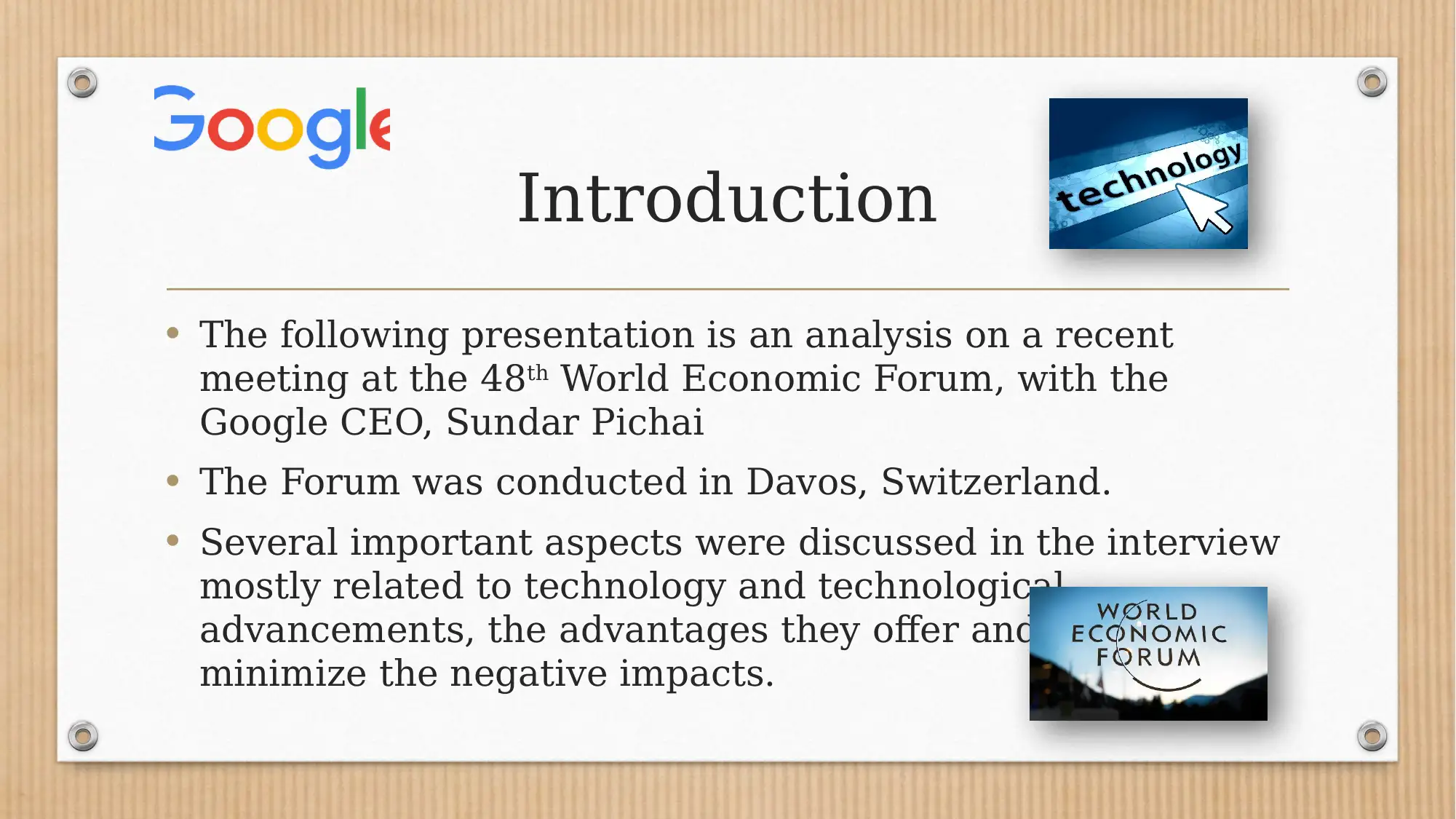
Introduction
• The following presentation is an analysis on a recent
meeting at the 48th World Economic Forum, with the
Google CEO, Sundar Pichai
• The Forum was conducted in Davos, Switzerland.
• Several important aspects were discussed in the interview
mostly related to technology and technological
advancements, the advantages they offer and how can we
minimize the negative impacts.
• The following presentation is an analysis on a recent
meeting at the 48th World Economic Forum, with the
Google CEO, Sundar Pichai
• The Forum was conducted in Davos, Switzerland.
• Several important aspects were discussed in the interview
mostly related to technology and technological
advancements, the advantages they offer and how can we
minimize the negative impacts.
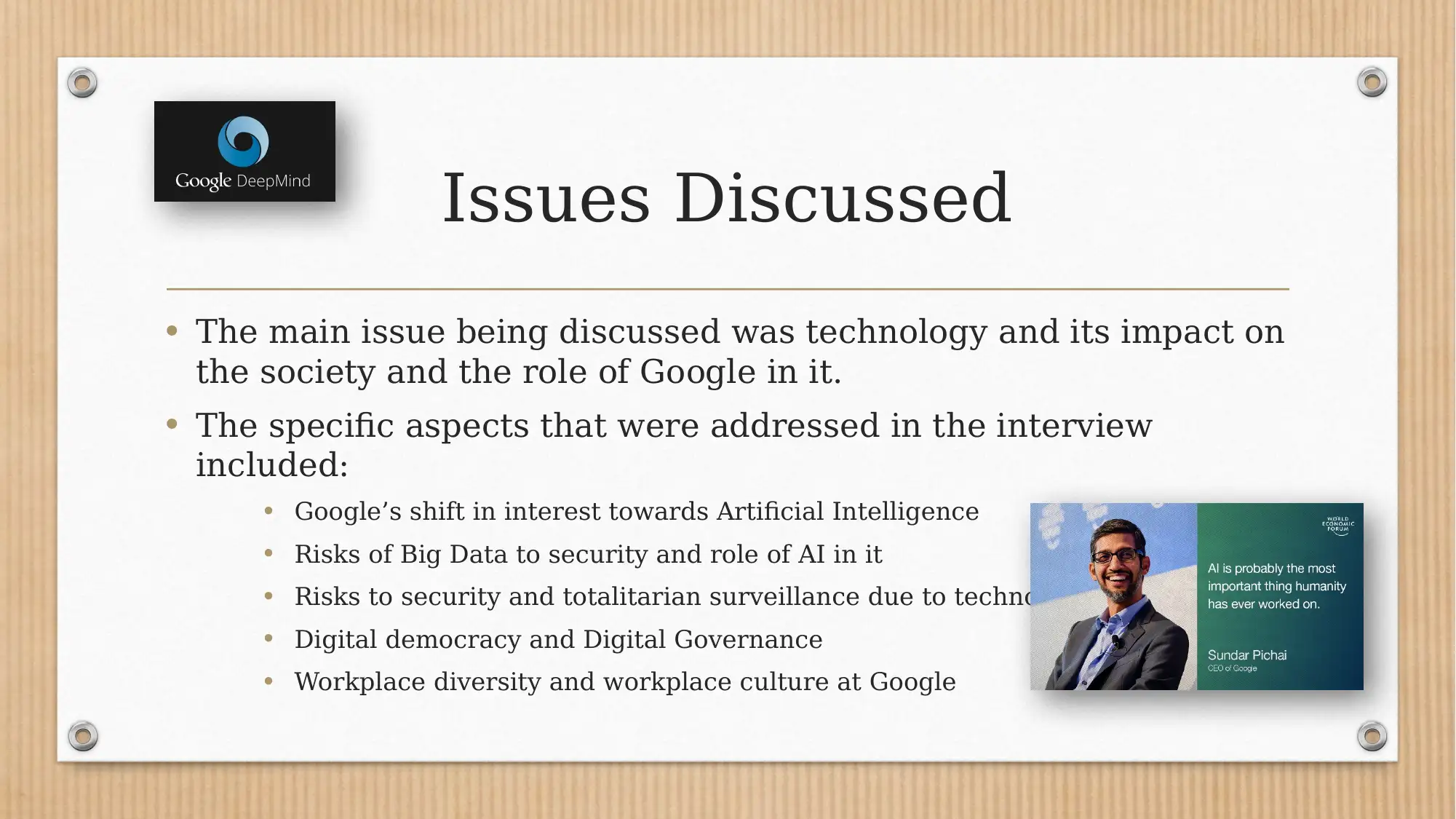
Issues Discussed
• The main issue being discussed was technology and its impact on
the society and the role of Google in it.
• The specific aspects that were addressed in the interview
included:
• Google’s shift in interest towards Artificial Intelligence
• Risks of Big Data to security and role of AI in it
• Risks to security and totalitarian surveillance due to technology
• Digital democracy and Digital Governance
• Workplace diversity and workplace culture at Google
• The main issue being discussed was technology and its impact on
the society and the role of Google in it.
• The specific aspects that were addressed in the interview
included:
• Google’s shift in interest towards Artificial Intelligence
• Risks of Big Data to security and role of AI in it
• Risks to security and totalitarian surveillance due to technology
• Digital democracy and Digital Governance
• Workplace diversity and workplace culture at Google
⊘ This is a preview!⊘
Do you want full access?
Subscribe today to unlock all pages.

Trusted by 1+ million students worldwide
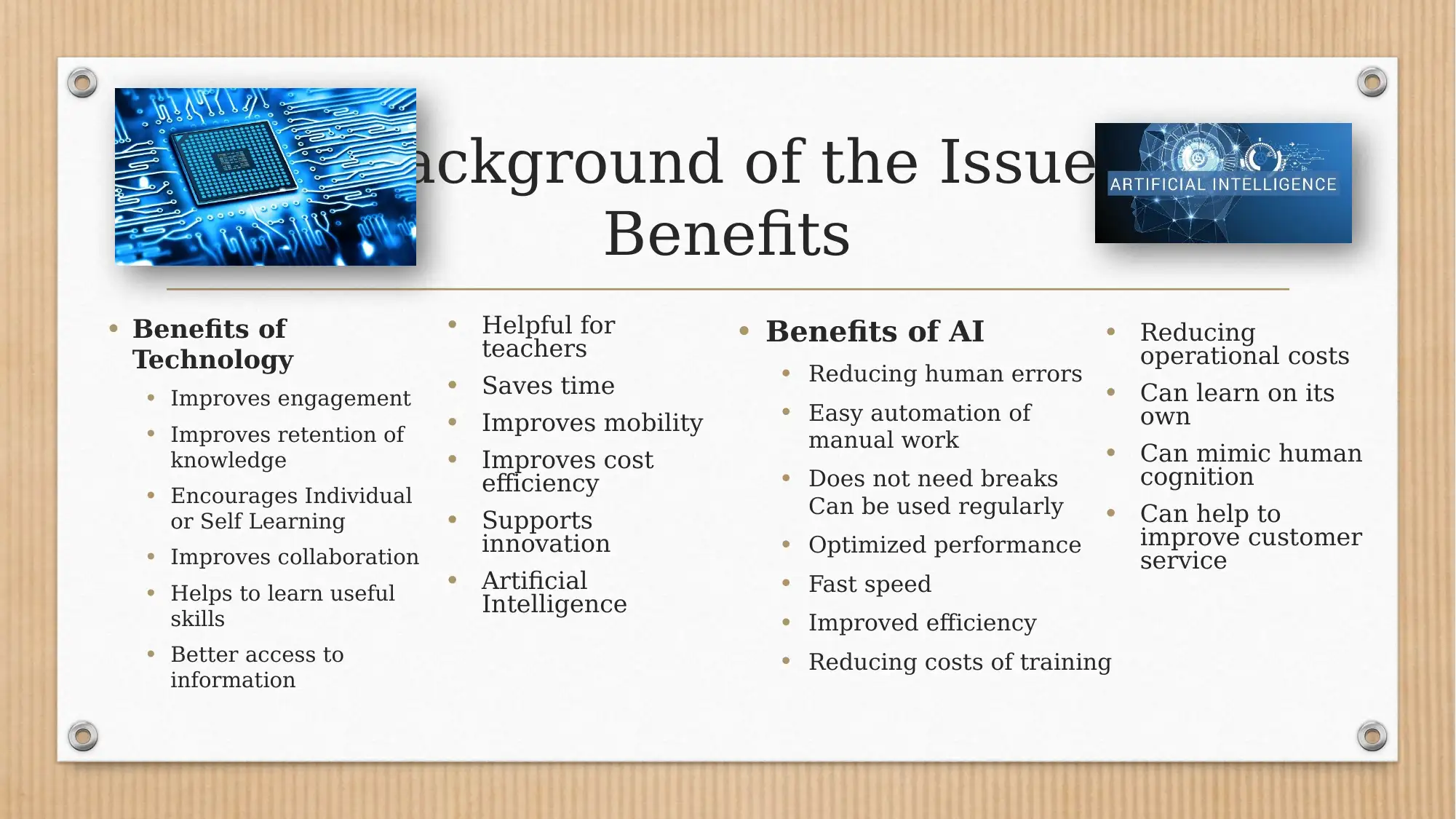
Background of the Issue
Benefits
• Benefits of
Technology
• Improves engagement
• Improves retention of
knowledge
• Encourages Individual
or Self Learning
• Improves collaboration
• Helps to learn useful
skills
• Better access to
information
• Helpful for
teachers
• Saves time
• Improves mobility
• Improves cost
efficiency
• Supports
innovation
• Artificial
Intelligence
• Benefits of AI
• Reducing human errors
• Easy automation of
manual work
• Does not need breaks
Can be used regularly
• Optimized performance
• Fast speed
• Improved efficiency
• Reducing costs of training
• Reducing
operational costs
• Can learn on its
own
• Can mimic human
cognition
• Can help to
improve customer
service
Benefits
• Benefits of
Technology
• Improves engagement
• Improves retention of
knowledge
• Encourages Individual
or Self Learning
• Improves collaboration
• Helps to learn useful
skills
• Better access to
information
• Helpful for
teachers
• Saves time
• Improves mobility
• Improves cost
efficiency
• Supports
innovation
• Artificial
Intelligence
• Benefits of AI
• Reducing human errors
• Easy automation of
manual work
• Does not need breaks
Can be used regularly
• Optimized performance
• Fast speed
• Improved efficiency
• Reducing costs of training
• Reducing
operational costs
• Can learn on its
own
• Can mimic human
cognition
• Can help to
improve customer
service
Paraphrase This Document
Need a fresh take? Get an instant paraphrase of this document with our AI Paraphraser
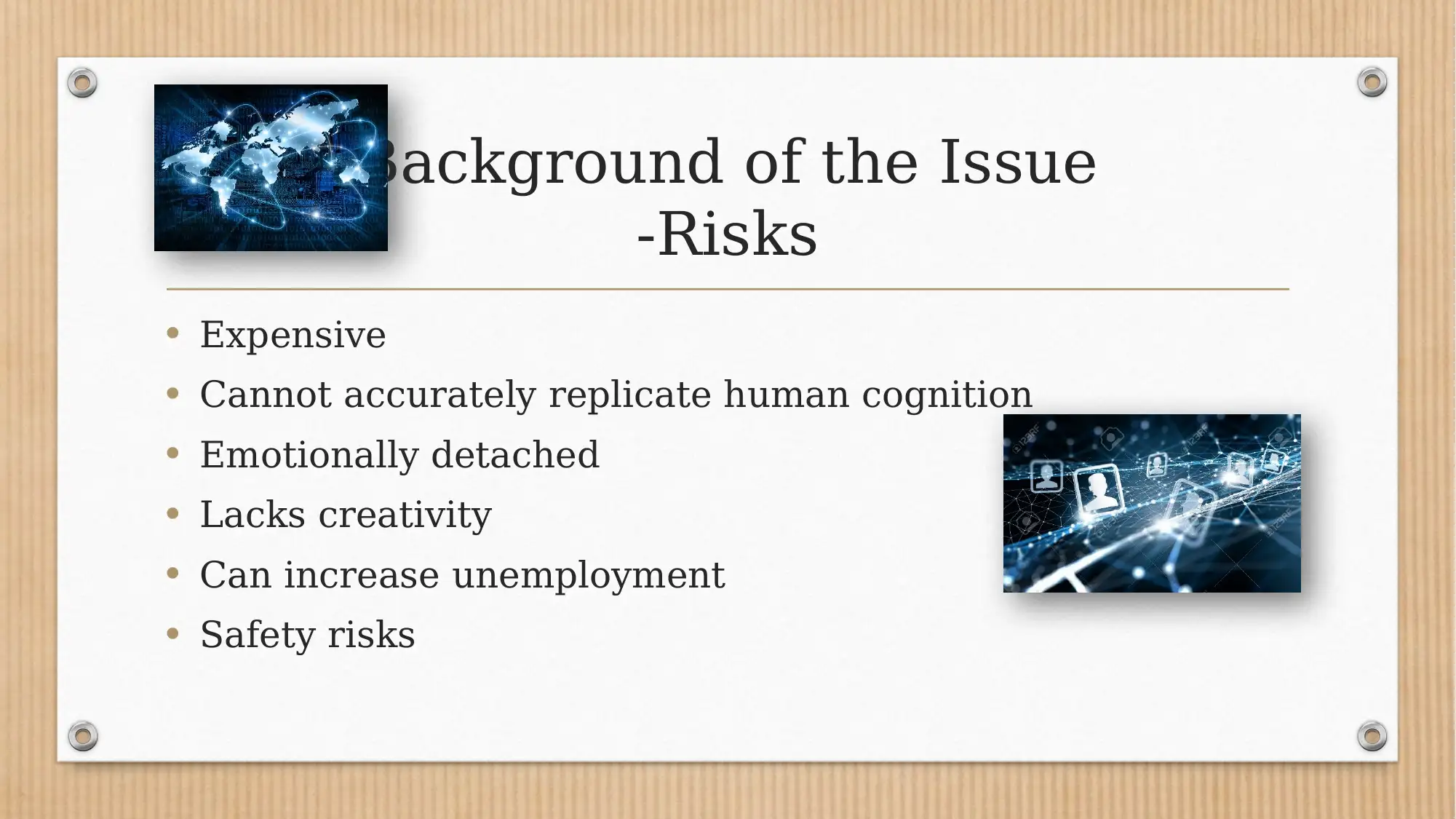
Background of the Issue
-Risks
• Expensive
• Cannot accurately replicate human cognition
• Emotionally detached
• Lacks creativity
• Can increase unemployment
• Safety risks
-Risks
• Expensive
• Cannot accurately replicate human cognition
• Emotionally detached
• Lacks creativity
• Can increase unemployment
• Safety risks
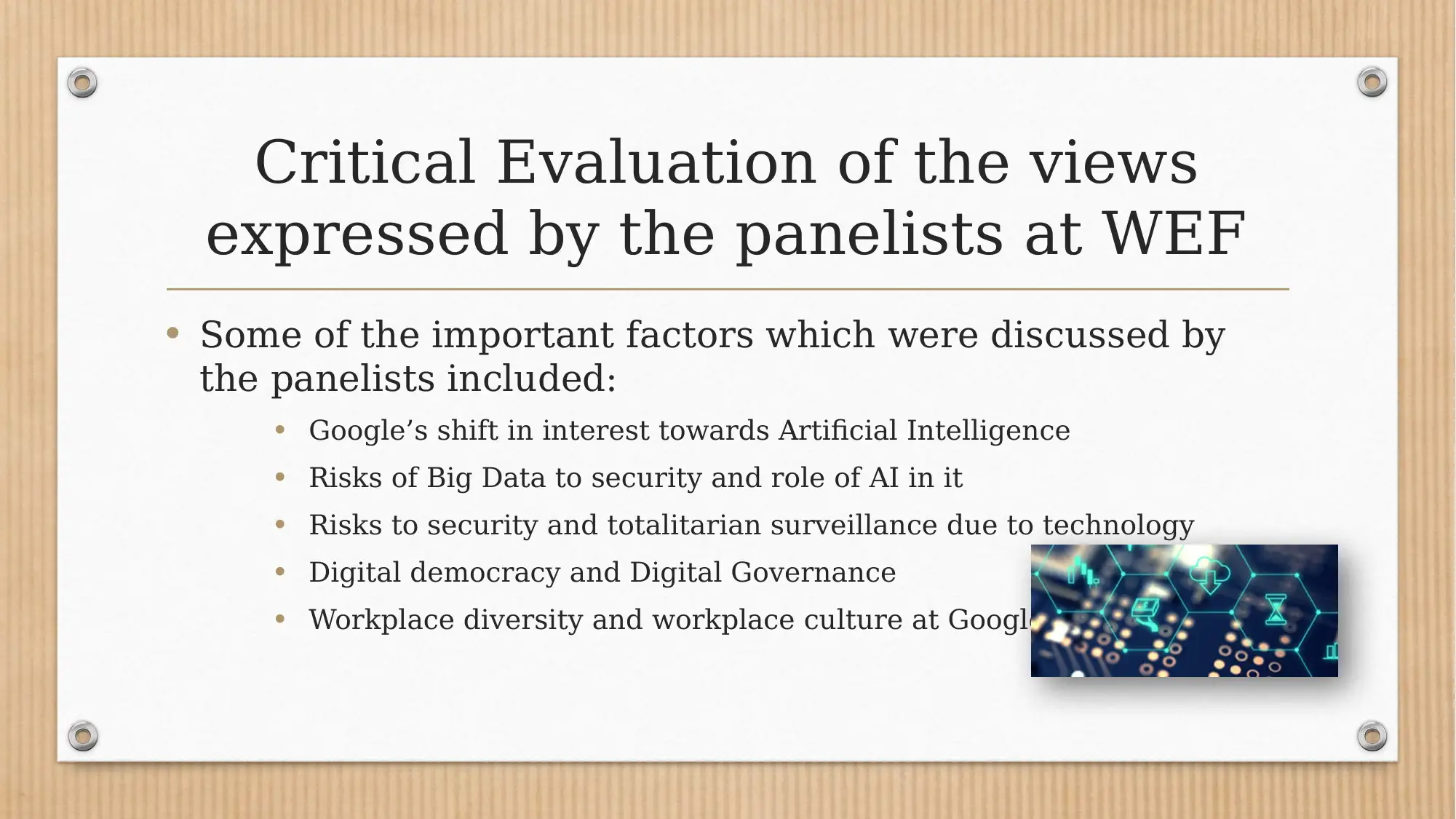
Critical Evaluation of the views
expressed by the panelists at WEF
• Some of the important factors which were discussed by
the panelists included:
• Google’s shift in interest towards Artificial Intelligence
• Risks of Big Data to security and role of AI in it
• Risks to security and totalitarian surveillance due to technology
• Digital democracy and Digital Governance
• Workplace diversity and workplace culture at Google
expressed by the panelists at WEF
• Some of the important factors which were discussed by
the panelists included:
• Google’s shift in interest towards Artificial Intelligence
• Risks of Big Data to security and role of AI in it
• Risks to security and totalitarian surveillance due to technology
• Digital democracy and Digital Governance
• Workplace diversity and workplace culture at Google
⊘ This is a preview!⊘
Do you want full access?
Subscribe today to unlock all pages.

Trusted by 1+ million students worldwide
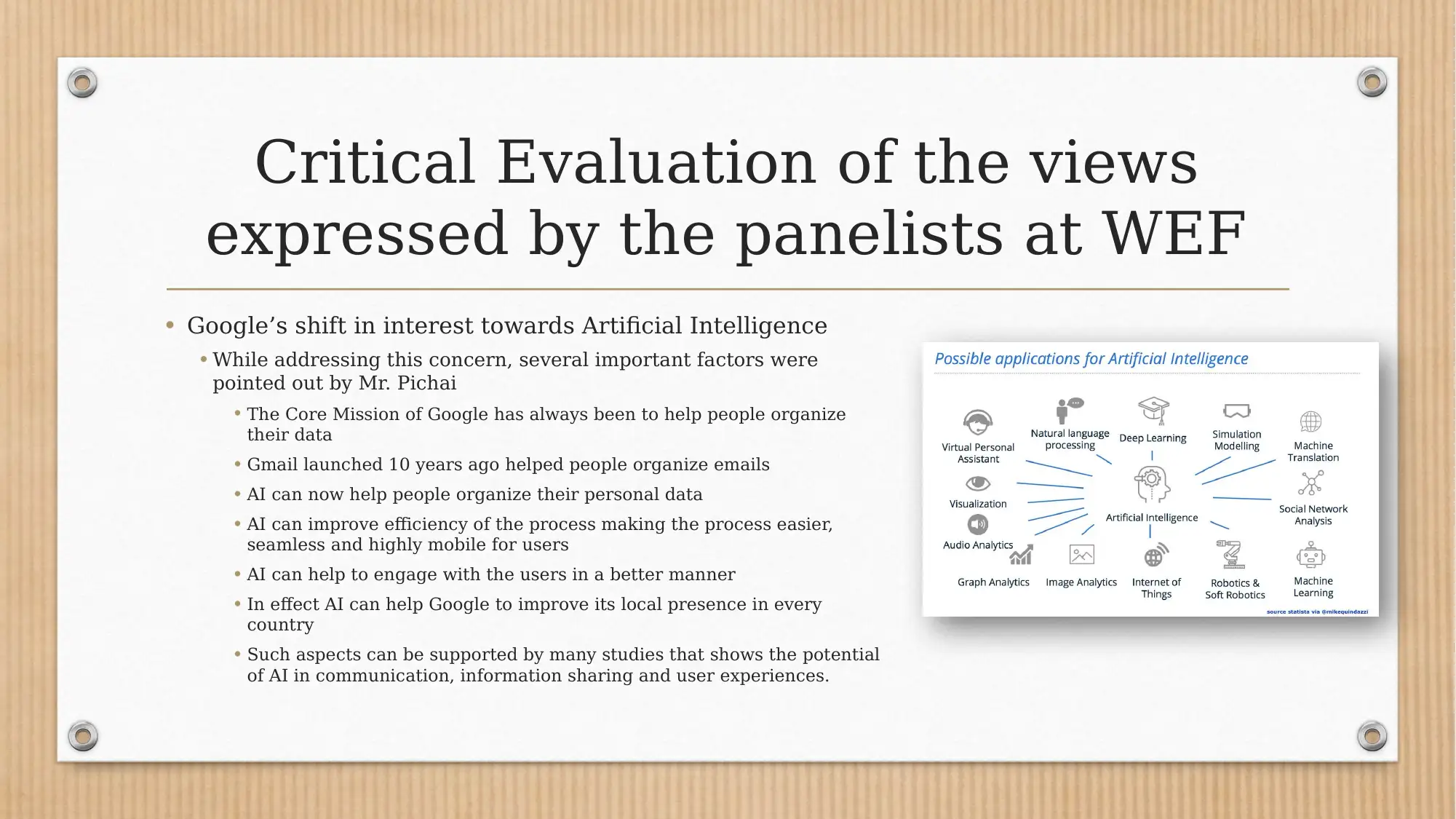
Critical Evaluation of the views
expressed by the panelists at WEF
• Google’s shift in interest towards Artificial Intelligence
• While addressing this concern, several important factors were
pointed out by Mr. Pichai
• The Core Mission of Google has always been to help people organize
their data
• Gmail launched 10 years ago helped people organize emails
• AI can now help people organize their personal data
• AI can improve efficiency of the process making the process easier,
seamless and highly mobile for users
• AI can help to engage with the users in a better manner
• In effect AI can help Google to improve its local presence in every
country
• Such aspects can be supported by many studies that shows the potential
of AI in communication, information sharing and user experiences.
expressed by the panelists at WEF
• Google’s shift in interest towards Artificial Intelligence
• While addressing this concern, several important factors were
pointed out by Mr. Pichai
• The Core Mission of Google has always been to help people organize
their data
• Gmail launched 10 years ago helped people organize emails
• AI can now help people organize their personal data
• AI can improve efficiency of the process making the process easier,
seamless and highly mobile for users
• AI can help to engage with the users in a better manner
• In effect AI can help Google to improve its local presence in every
country
• Such aspects can be supported by many studies that shows the potential
of AI in communication, information sharing and user experiences.
Paraphrase This Document
Need a fresh take? Get an instant paraphrase of this document with our AI Paraphraser
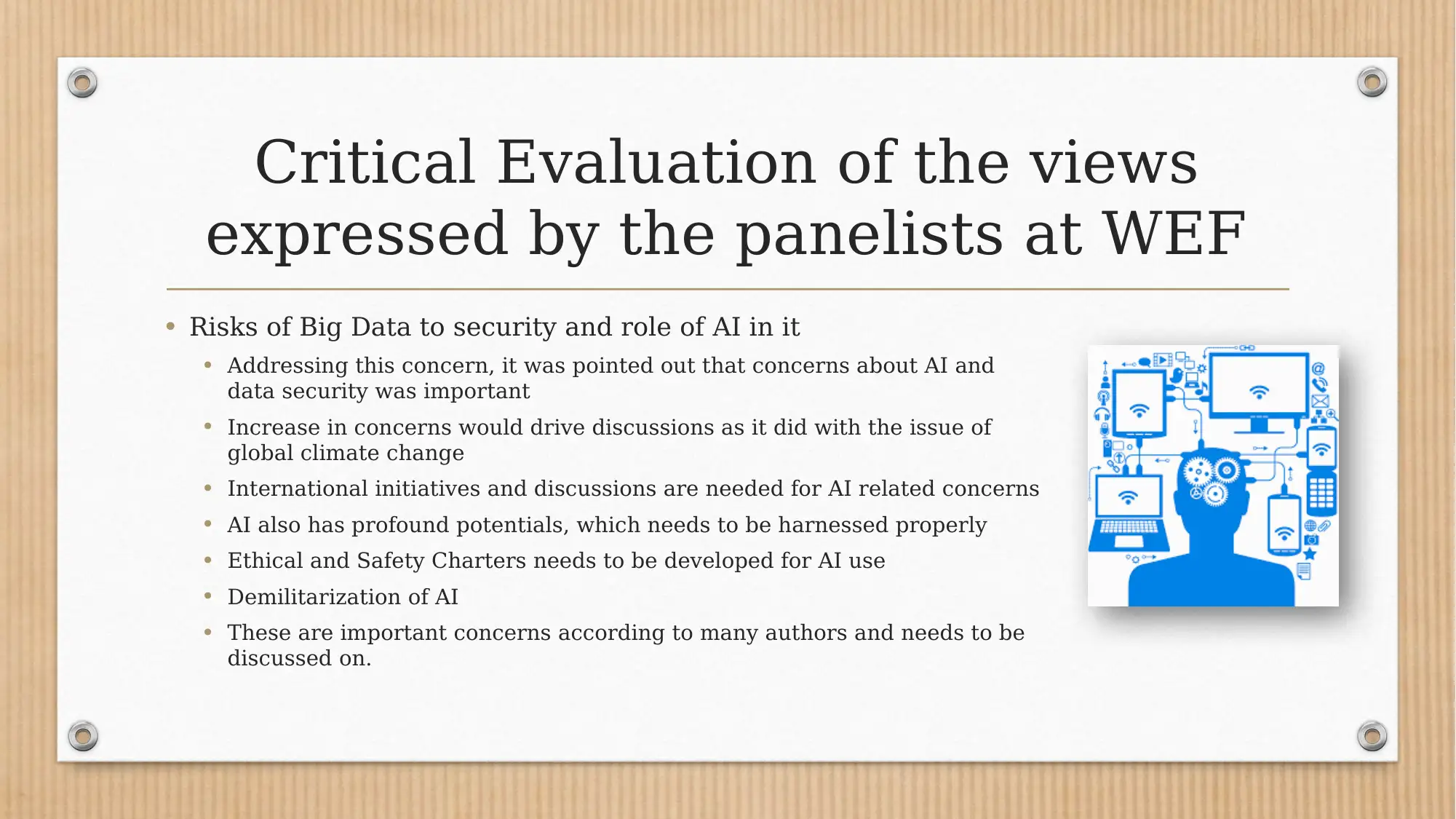
Critical Evaluation of the views
expressed by the panelists at WEF
• Risks of Big Data to security and role of AI in it
• Addressing this concern, it was pointed out that concerns about AI and
data security was important
• Increase in concerns would drive discussions as it did with the issue of
global climate change
• International initiatives and discussions are needed for AI related concerns
• AI also has profound potentials, which needs to be harnessed properly
• Ethical and Safety Charters needs to be developed for AI use
• Demilitarization of AI
• These are important concerns according to many authors and needs to be
discussed on.
expressed by the panelists at WEF
• Risks of Big Data to security and role of AI in it
• Addressing this concern, it was pointed out that concerns about AI and
data security was important
• Increase in concerns would drive discussions as it did with the issue of
global climate change
• International initiatives and discussions are needed for AI related concerns
• AI also has profound potentials, which needs to be harnessed properly
• Ethical and Safety Charters needs to be developed for AI use
• Demilitarization of AI
• These are important concerns according to many authors and needs to be
discussed on.
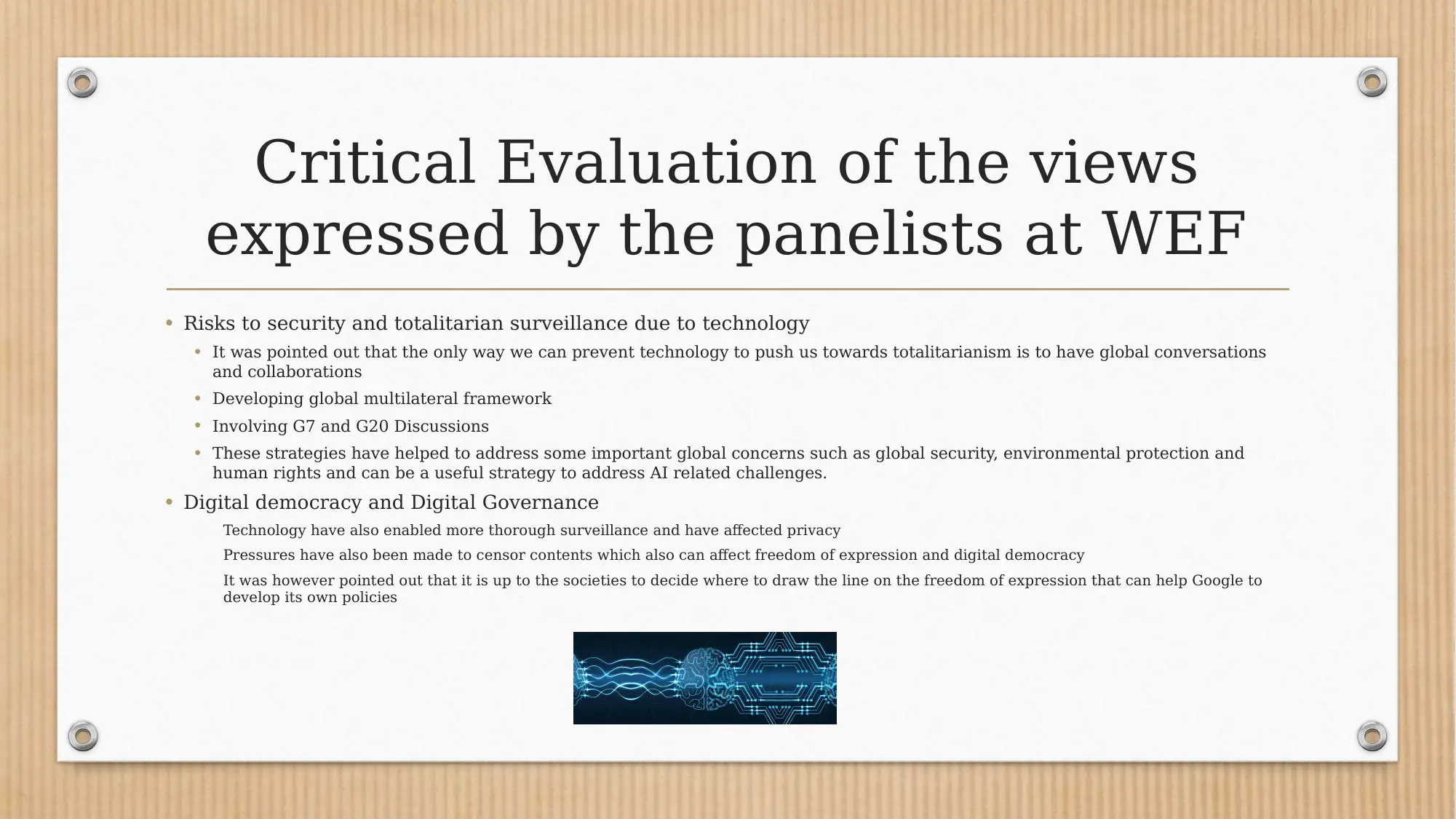
Critical Evaluation of the views
expressed by the panelists at WEF
• Risks to security and totalitarian surveillance due to technology
• It was pointed out that the only way we can prevent technology to push us towards totalitarianism is to have global conversations
and collaborations
• Developing global multilateral framework
• Involving G7 and G20 Discussions
• These strategies have helped to address some important global concerns such as global security, environmental protection and
human rights and can be a useful strategy to address AI related challenges.
• Digital democracy and Digital Governance
Technology have also enabled more thorough surveillance and have affected privacy
Pressures have also been made to censor contents which also can affect freedom of expression and digital democracy
It was however pointed out that it is up to the societies to decide where to draw the line on the freedom of expression that can help Google to
develop its own policies
expressed by the panelists at WEF
• Risks to security and totalitarian surveillance due to technology
• It was pointed out that the only way we can prevent technology to push us towards totalitarianism is to have global conversations
and collaborations
• Developing global multilateral framework
• Involving G7 and G20 Discussions
• These strategies have helped to address some important global concerns such as global security, environmental protection and
human rights and can be a useful strategy to address AI related challenges.
• Digital democracy and Digital Governance
Technology have also enabled more thorough surveillance and have affected privacy
Pressures have also been made to censor contents which also can affect freedom of expression and digital democracy
It was however pointed out that it is up to the societies to decide where to draw the line on the freedom of expression that can help Google to
develop its own policies
⊘ This is a preview!⊘
Do you want full access?
Subscribe today to unlock all pages.

Trusted by 1+ million students worldwide
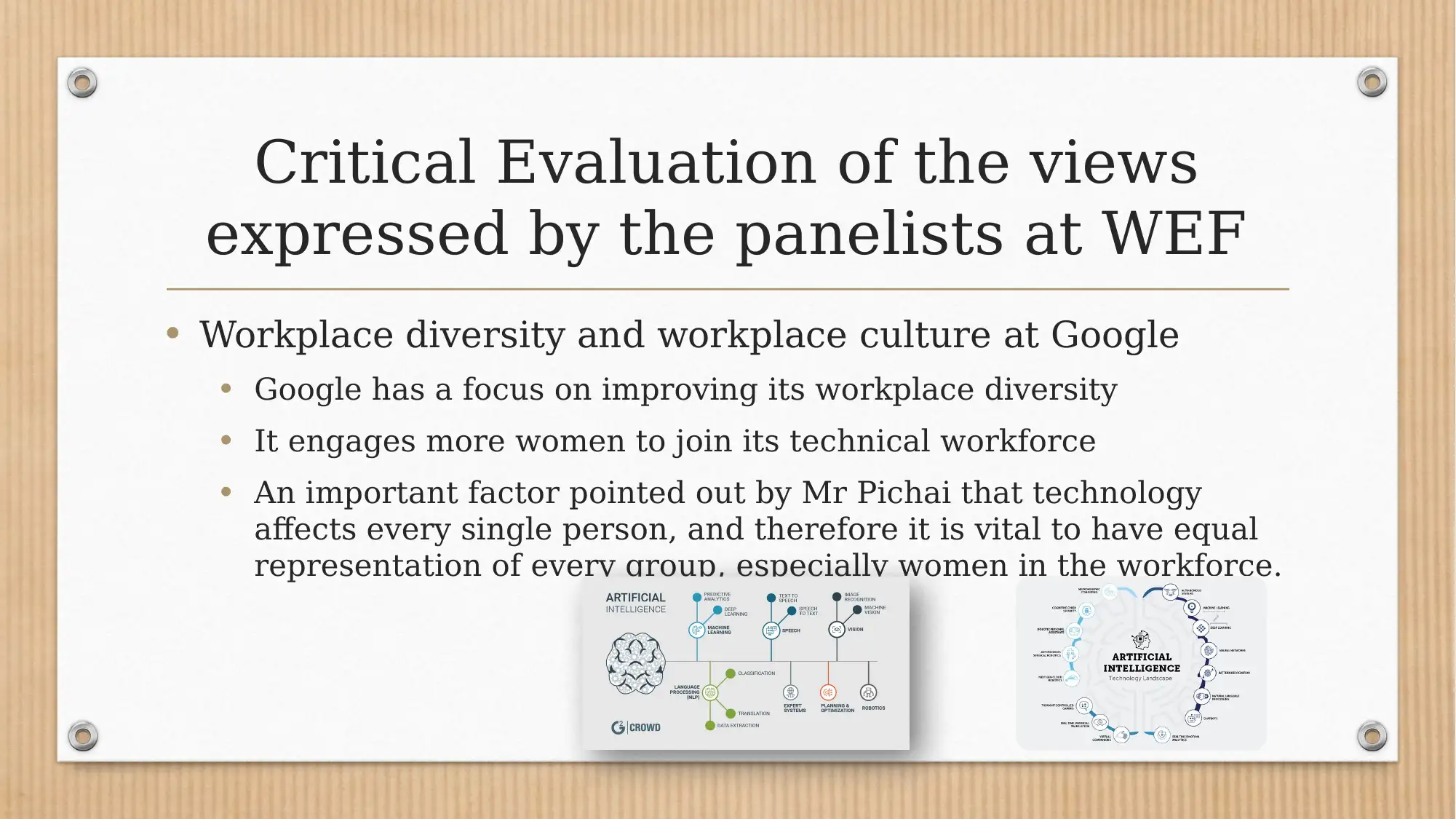
Critical Evaluation of the views
expressed by the panelists at WEF
• Workplace diversity and workplace culture at Google
• Google has a focus on improving its workplace diversity
• It engages more women to join its technical workforce
• An important factor pointed out by Mr Pichai that technology
affects every single person, and therefore it is vital to have equal
representation of every group, especially women in the workforce.
expressed by the panelists at WEF
• Workplace diversity and workplace culture at Google
• Google has a focus on improving its workplace diversity
• It engages more women to join its technical workforce
• An important factor pointed out by Mr Pichai that technology
affects every single person, and therefore it is vital to have equal
representation of every group, especially women in the workforce.
Paraphrase This Document
Need a fresh take? Get an instant paraphrase of this document with our AI Paraphraser
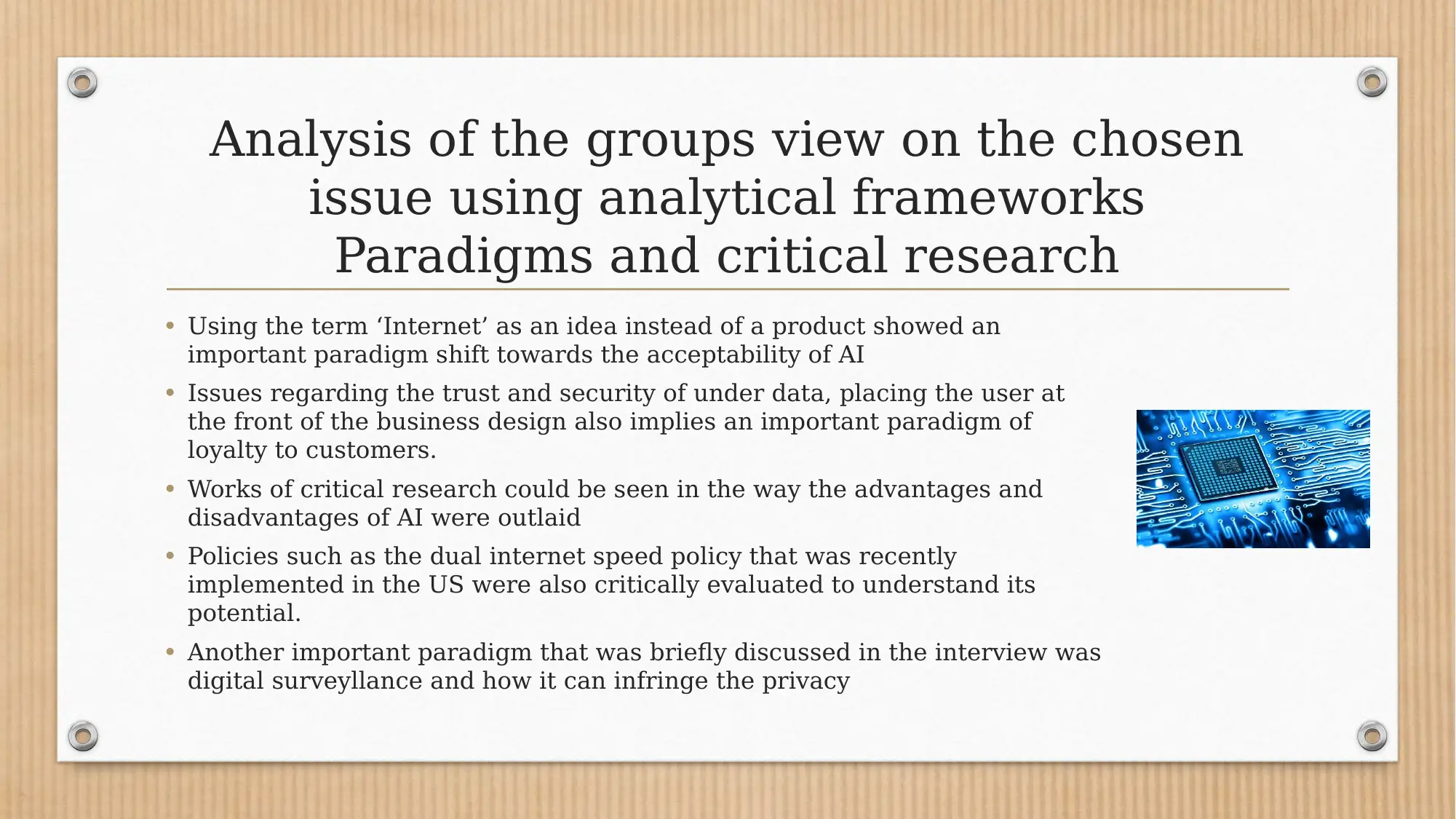
Analysis of the groups view on the chosen
issue using analytical frameworks
Paradigms and critical research
• Using the term ‘Internet’ as an idea instead of a product showed an
important paradigm shift towards the acceptability of AI
• Issues regarding the trust and security of under data, placing the user at
the front of the business design also implies an important paradigm of
loyalty to customers.
• Works of critical research could be seen in the way the advantages and
disadvantages of AI were outlaid
• Policies such as the dual internet speed policy that was recently
implemented in the US were also critically evaluated to understand its
potential.
• Another important paradigm that was briefly discussed in the interview was
digital surveyllance and how it can infringe the privacy
issue using analytical frameworks
Paradigms and critical research
• Using the term ‘Internet’ as an idea instead of a product showed an
important paradigm shift towards the acceptability of AI
• Issues regarding the trust and security of under data, placing the user at
the front of the business design also implies an important paradigm of
loyalty to customers.
• Works of critical research could be seen in the way the advantages and
disadvantages of AI were outlaid
• Policies such as the dual internet speed policy that was recently
implemented in the US were also critically evaluated to understand its
potential.
• Another important paradigm that was briefly discussed in the interview was
digital surveyllance and how it can infringe the privacy
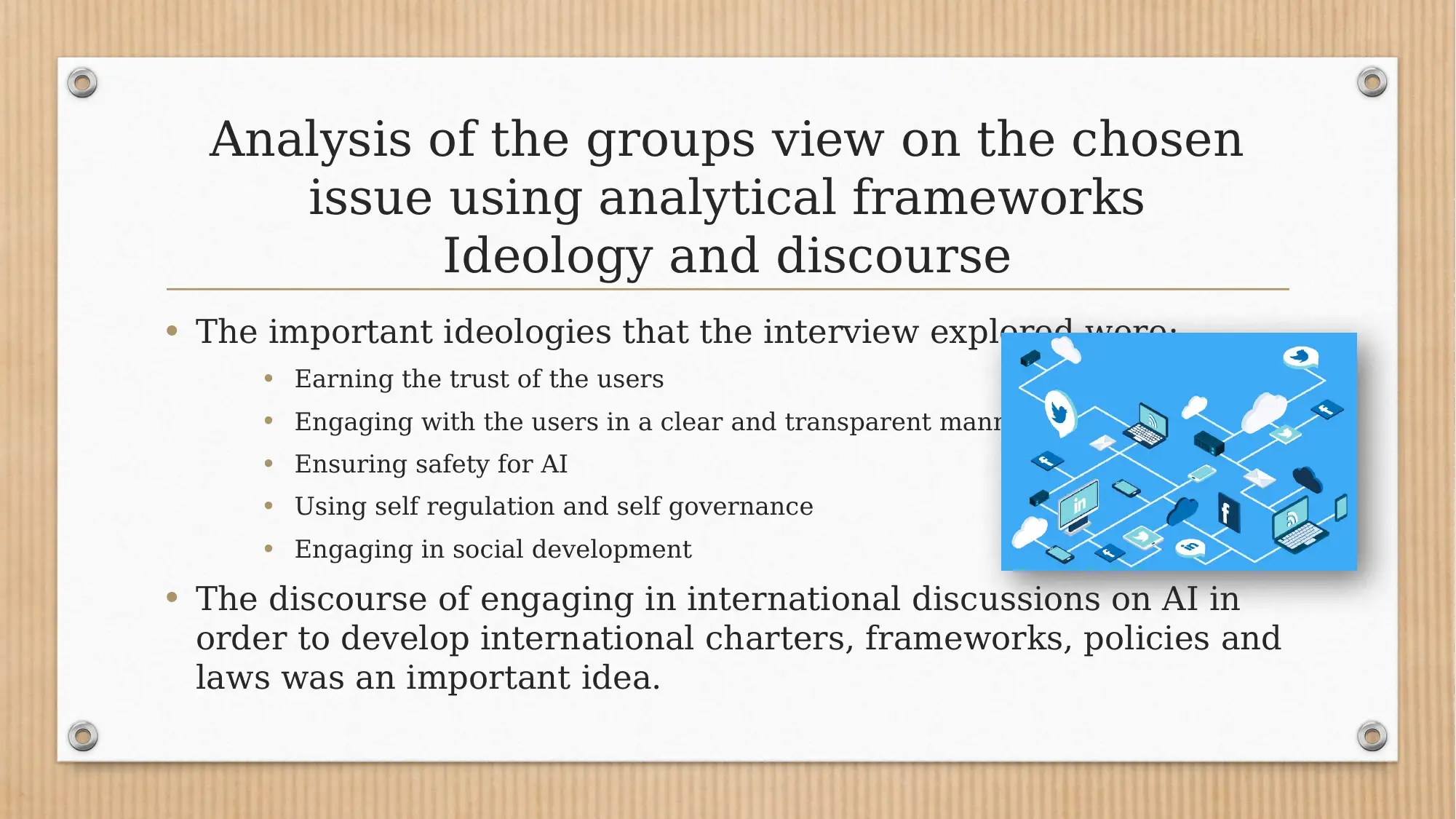
Analysis of the groups view on the chosen
issue using analytical frameworks
Ideology and discourse
• The important ideologies that the interview explored were:
• Earning the trust of the users
• Engaging with the users in a clear and transparent manner
• Ensuring safety for AI
• Using self regulation and self governance
• Engaging in social development
• The discourse of engaging in international discussions on AI in
order to develop international charters, frameworks, policies and
laws was an important idea.
issue using analytical frameworks
Ideology and discourse
• The important ideologies that the interview explored were:
• Earning the trust of the users
• Engaging with the users in a clear and transparent manner
• Ensuring safety for AI
• Using self regulation and self governance
• Engaging in social development
• The discourse of engaging in international discussions on AI in
order to develop international charters, frameworks, policies and
laws was an important idea.
⊘ This is a preview!⊘
Do you want full access?
Subscribe today to unlock all pages.

Trusted by 1+ million students worldwide
1 out of 18
Related Documents
Your All-in-One AI-Powered Toolkit for Academic Success.
+13062052269
info@desklib.com
Available 24*7 on WhatsApp / Email
![[object Object]](/_next/static/media/star-bottom.7253800d.svg)
Unlock your academic potential
Copyright © 2020–2026 A2Z Services. All Rights Reserved. Developed and managed by ZUCOL.


